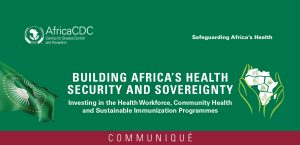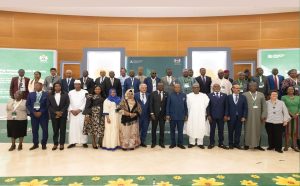We, African Union Ministers of Health and Heads of Delegation gathered on 24–25 June 2020 for the virtual conference to develop a vaccine strategy for coronavirus disease 2019 (COVID-19) in Africa.
Preamble
RECALLING the Heads of State and Government’s Declaration in July 2013 at the African Union Special Summit on HIV, TB and Malaria in Abuja, Nigeria, in which African leaders recognised the need for an Africa Centres for Disease Control and Prevention (Africa CDC) to conduct life-saving research on priority health challenges and to serve as a platform to share knowledge and build capacity to respond to public health emergencies and threats in Africa.
NOTING that the African Union Assembly of Heads of State and Government in 2014 devoted to responding to the Ebola virus disease outbreak, African leaders formally endorsed an accelerated timeline to launch Africa CDC, together with its five Regional Collaborating Centres.
FURTHER NOTING that Africa CDC was launched in January 2017 and established as a specialised technical institution of the African Union, with the responsibility of promoting the control and prevention of diseases in Africa.
CONSCIOUS of the fact that the COVID-19 outbreak was declared a public health emergency of international concern (PHEIC) by the World Health Organization (WHO) on 30 January 2020, and declared a pandemic on 11 March 2020, having infected over 9 million persons and caused the deaths of nearly half a million persons globally – including more than 350,000 cases and 9,000 deaths on the African continent.
ALSO CONSCIOUS of the fact that any further potential spread of COVID-19 on the continent is a social, economic, and security threat for Africa, and that the African Union Agenda 2063, which is a strategic framework for the socio-economic transformation of the continent over the next 50 years, will be severely disrupted by disease outbreaks such as COVID-19 if there are no measures for timely coordination, collaboration, communication, and cooperation.
COGNISANT that COVID-19 is spreading rapidly across our continent, which will compound the existing health challenges that Africa already faces, including: (1) rapid population growth leading to increased population movement across the continent and the world; (2) existing endemic diseases such as HIV, TB, and malaria, (re-) emerging infectious diseases, and the ascendance of antimicrobial resistance; (3) increasing incidence of non-communicable diseases and injuries; (4) persistently high maternal mortality rates; (5) threats posed by environmental toxins; and (6) fragile health infrastructure, with limited resilience to numerous disease outbreaks.
RECALLING the 29th Ordinary Session of the African Union Assembly of Heads of State and Government, held in Addis Ababa, Ethiopia from 3 to 4 July 2017; in which the Heads of State expressed deep concern about the increasing recurrence of epidemics on our continent and their enormous socio-economic impact, as well as the inadequate implementation of the International Health Regulations 2005 (IHR). As such, they committed to: (1) accelerate the implementation of IHR at national, provincial and local levels with a clear roadmap and monitoring mechanisms; (2) institute multi-sectorial mechanisms to accelerate the implementation of IHR; and (3) mobilise the necessary resources to implement the roadmaps for acceleration of implementation of IHR.
FURTHER RECALLING the WHO’s role in managing IHR capacity development in Member States.
NOTING the duty and political mandate of national public health institutes (NPHIs) to respond to PHEIC, working in partnership with WHO and all relevant stakeholders.
ALSO NOTING the strong evidence that health security depends on the establishment of resilient and adaptive national health systems, with a clearly defined public health coordination mechanism.
RECALLING that during the 22 February 2020 emergency meeting of African Ministers of Health, Ministers endorsed the Africa Joint Continental Strategy for COVID-19 Outbreak, including Africa CDC’s leadership role in coordinating the response on the continent.
RECOGNISING the efforts by African Union Member States in response to the COVID-19 pandemic, with a focus on how the continent can prepare for the research and development, manufacturing, procurement, financing, delivery and uptake of a potential COVID-19 vaccine.
The Conference on Africa’s Leadership on COVID-19 Vaccine Development and Access
COLLECTIVELY agrees that identifying and scaling-up an effective COVID-19 vaccine is critical to slow the spread of the disease, protect vulnerable populations and ultimately return our society and economies back to normal and towards Africa’s broader global development agenda.
RECOGNISE the barriers that intellectual property, including patents, trade secrets and other technological knowhow has posed to timely introduction of affordable vaccines in developing countries in the past.
ACKNOWLEDGE this experience, noting that there is an urgent need for countries to make full use of legal and policy measures, including flexibilities enshrined under the Agreement on Trade-Related Aspects of Intellectual Property Rights (TRIPS) and Doha Declaration, South-South and North-South collaboration to ensure monopolies do not stand in the way of access to COVID-19 vaccines.
COMMEND the efforts of Africa CDC to coordinate implementation of the Africa Joint Continental Strategy for COVID-19 Outbreak and to rapidly establish an Africa COVID-19 vaccine development and access strategy, which will serve as the roadmap to better coordinate and scale-up efforts across Africa. The strategy will have two major prongs:
- securing sufficient vaccine supply; and
- removing barriers to vaccine roll-out
WELCOME the close collaboration between Africa CDC, WHO, African Vaccine Regulatory Forum as well as other relevant stakeholders in supporting countries to strengthen their capacity to adopt and scale-up a vaccine for COVID-19, once clinical approval of a viable vaccine candidate is achieved.
(i) Securing Sufficient Vaccine Supply
ADVOCATE for Africa to receive a sufficient global allocation for timely access to a potential COVID-19 vaccine, including partnership with the COVAX facility within the Access to COVID-19 Tools (ACT) Accelerator initiative, and additional support from partner countries and regional bodies.
CALL FOR an equitable and timely distribution of vaccine supply within the African continent, both across and within countries, taking into account equity in gender and socioeconomic status.
CALL UPON the African Union Commission, donors, and partners to support Africa’s efforts to secure the necessary vaccine supply by providing the necessary financial resources.
ALSO CALL UPON all countries to remove all obstacles, including, but not limited to, the use of the flexibilities provided in the TRIPS agreement, in line with the recommendations of the 73rd World Health Assembly resolution on the COVID-19 response, to ensure that all relevant technologies, intellectual property, data and know how are openly and immediately made available and rapidly scaled-up.
FURTHER CALL UPON African Union Member States to raise domestic resources to support the efforts to secure upfront vaccine supplies for the continent.
(ii) Removing Barriers to Vaccine Roll-out
DEVELOP a continent-wide clinical trial network to better connect organisations that are supporting efforts to test potential vaccine candidates; a network responsible for sharing information, resources, and knowledge in order to increase the data on vaccine efficacy and safety for the African population.
ENABLE an effective regulatory control structure for the vaccine, which includes implementing indemnification for vaccine manufacturers, fast-tracked regulatory approvals at country level, and a robust infrastructure for ongoing monitoring of vaccine efficacy and safety.
ENSURE that the vaccine can be effectively delivered to target populations by strengthening distribution and supply chain networks in countries, and deploying innovative delivery models to reach the people in need.
DRIVE a set of community engagement efforts across the continent to better inform key opinion leaders and the general public on the need for the vaccine and the benefit thereof, to ensure effective uptake and minimise the dissemination of inaccurate public health information.
PARTNER and collaborate with relevant global stakeholders to enable technology transfer to ramp up domestic vaccine production capacity so that Africa can better control its supply of the vaccine over time.
REQUEST the African Union Commission and Africa CDC to follow-up on the implementation of Africa COVID-19 vaccines development and access strategy, and report to the African Union Heads of State and Government regularly and seek collaboration with United Nations agencies and other partners.







